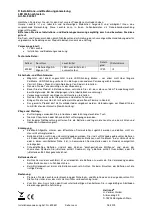
Glossary
WILINK I MODULAR BASE STATION SYSTEM MANUAL
200
FEC
Forward Error Correction. A method of communicating data that can
corrects errors in transmission on the receiving end. Prior to transmission,
the data is put through a predetermined algorithm that adds extra bits
specifically for error correction to any character or code block. If the
transmission is received in error, the correction bits are used to check and
repair the data.
FFT
Fast Fourier Transform. An algorithm for converting data from the time
domain to the frequency domain; often used in signal processing.
FTP
File Transfer Protocol. A protocol for exchanging files over the Internet. FTP
uses the Internet's TCP/IP protocols to enable data transfer.
G.711
A 64 Kbps PCM voice-coding technique. Described in the ITU-T standard in
its G-series recommendations.
G.723.1
A compression technique that can be used for compressing speech or audio
signal components at a very low bit rate as part of the H.324 family of
standards. This codec has two bit rates associated with it: 5.3 and 6.3
Kbps. The higher bit rate provides a somewhat higher quality of sound. The
lower bit rate provides system designers with additional flexibility.
Described in the ITU-T standard in its G-series recommendations.
G.729
A compression technique where voice is coded into 8 Kbps streams. There
are two variations of this standard (G.729 and G.729 Annex A) that differ
mainly in computational complexity; both provide speech quality similar to
32-kbps ADPCM. Described in the ITU-T standard in its G-series
recommendations.
GPS
Global Positioning System. A system that uses satellites, receivers and
software to allow users to determine their precise geographic position.
H.323
A protocol suite defined by ITU-T for voice transmission over internet (Voice
over IP or VoIP). In addition to voice applications, H.323 provides
mechanisms for video communication and data collaboration, in
combination with the ITU-T T.120 series standards.
IB
In-Band
IDU
Indoor Unit
IEEE
Institute of Electrical and Electronics Engineers. IEEE (pronounced I-triple-
E) is an organization composed of engineers, scientists, and students. The
IEEE is best known for developing standards for the computer and
electronics industry. In particular, the IEEE 802 standards for local-area
networks are widely followed.
IEEE 802.1p
A QoS method - A three-bit value that can be placed inside an 802.1Q frame
tag.
















































